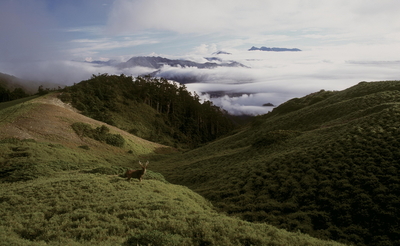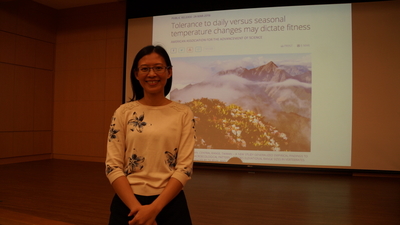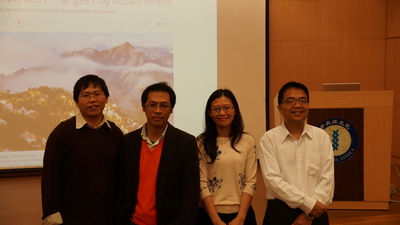NCKU professor’s research on climatic variability published in Science




Tainan, Taiwan, March 25, 2016
Climate variability increases with global warming but very little is known about how species adapt to it. National Cheng Kung University (NCKU) professor Dr. I-Ching Chen working with scientists from Academia Sinica proposed that long-term and short-term climatic variabilities affect species in opposite ways.
This finding challenged the classic ecological hypothesis to provide a clear roadmap to understand how species adapt to climatic variabilities, Chen reported at a press conference Friday.
The research was published in the journal Science on March 24, 2016.
This study challenged a well-known macrophysiological rule-Climatic Variability Hypothesis (CVH), which suggests that greater variability selects for organisms with broader tolerances, enabling them to be geographically widespread.
“We bring a novel perspective that temporal scale actually matters and short-term climatic variability favors physiological specialist,” said Chen.
She noted, “In fact, short term variability, such as daily temperature range (DTR), dominants the majority of the earth surface but the ecological implication has seldom been discussed. It’s very likely that there are more specialist species than we expected and they are particularly vulnerable to climate change.”
Talking about her field research, Chen said, “We have been investigated species distribution, breeding performance and competition along elevation gradient in Taiwan, using burying beetle as target species. We found that daily temperature range is crucial to determine their range limits, hence range size, through changing species competition and breeding performance.”
“However, DTR has seldom been covered in ecological theories and we wondered whether this finding could be generalized. That’s why we started to investigate and re-exam the macrophysiological rule in determining species range size,” she added.
Chen, whose research interests are global change biology, macroecology, and dendroclimatology, said, Mechanistic understanding of species distribution and range shift is crucial to investigate biological responses under climate change.
The pattern of climatic variability features a large proportion of the rapid climate change, Chen noted, “and our finding will have important implication for not only fundamental ecology but also human wellbeing issues related to species distribution such as invasion and spread of vector-borne diseases.”
Chen, a life sciences professor at NCKU, is currently leading a biology laboratory for climate change to explore issues on adaptive mechanism and altered species interaction under climate change, especially the vulnerability of tropical montane cloud forest.
She said, Taiwan is dominant by mountains, where host high biodiversity and is easy to access. The elevational gradient serves as natural lab as we experience significant temperature change and observe species turnover in short distance.
This enables us to conduct extensive field work and manipulation experiments to understand interaction of biotic and abiotic factors involving in many ecological phenomena, Chen noted.
Enditem/
Climate variability increases with global warming but very little is known about how species adapt to it. National Cheng Kung University (NCKU) professor Dr. I-Ching Chen working with scientists from Academia Sinica proposed that long-term and short-term climatic variabilities affect species in opposite ways.
This finding challenged the classic ecological hypothesis to provide a clear roadmap to understand how species adapt to climatic variabilities, Chen reported at a press conference Friday.
The research was published in the journal Science on March 24, 2016.
This study challenged a well-known macrophysiological rule-Climatic Variability Hypothesis (CVH), which suggests that greater variability selects for organisms with broader tolerances, enabling them to be geographically widespread.
“We bring a novel perspective that temporal scale actually matters and short-term climatic variability favors physiological specialist,” said Chen.
She noted, “In fact, short term variability, such as daily temperature range (DTR), dominants the majority of the earth surface but the ecological implication has seldom been discussed. It’s very likely that there are more specialist species than we expected and they are particularly vulnerable to climate change.”
Talking about her field research, Chen said, “We have been investigated species distribution, breeding performance and competition along elevation gradient in Taiwan, using burying beetle as target species. We found that daily temperature range is crucial to determine their range limits, hence range size, through changing species competition and breeding performance.”
“However, DTR has seldom been covered in ecological theories and we wondered whether this finding could be generalized. That’s why we started to investigate and re-exam the macrophysiological rule in determining species range size,” she added.
Chen, whose research interests are global change biology, macroecology, and dendroclimatology, said, Mechanistic understanding of species distribution and range shift is crucial to investigate biological responses under climate change.
The pattern of climatic variability features a large proportion of the rapid climate change, Chen noted, “and our finding will have important implication for not only fundamental ecology but also human wellbeing issues related to species distribution such as invasion and spread of vector-borne diseases.”
Chen, a life sciences professor at NCKU, is currently leading a biology laboratory for climate change to explore issues on adaptive mechanism and altered species interaction under climate change, especially the vulnerability of tropical montane cloud forest.
She said, Taiwan is dominant by mountains, where host high biodiversity and is easy to access. The elevational gradient serves as natural lab as we experience significant temperature change and observe species turnover in short distance.
This enables us to conduct extensive field work and manipulation experiments to understand interaction of biotic and abiotic factors involving in many ecological phenomena, Chen noted.
Enditem/
Provider:
NCKU News
Date:
2016/03/29



